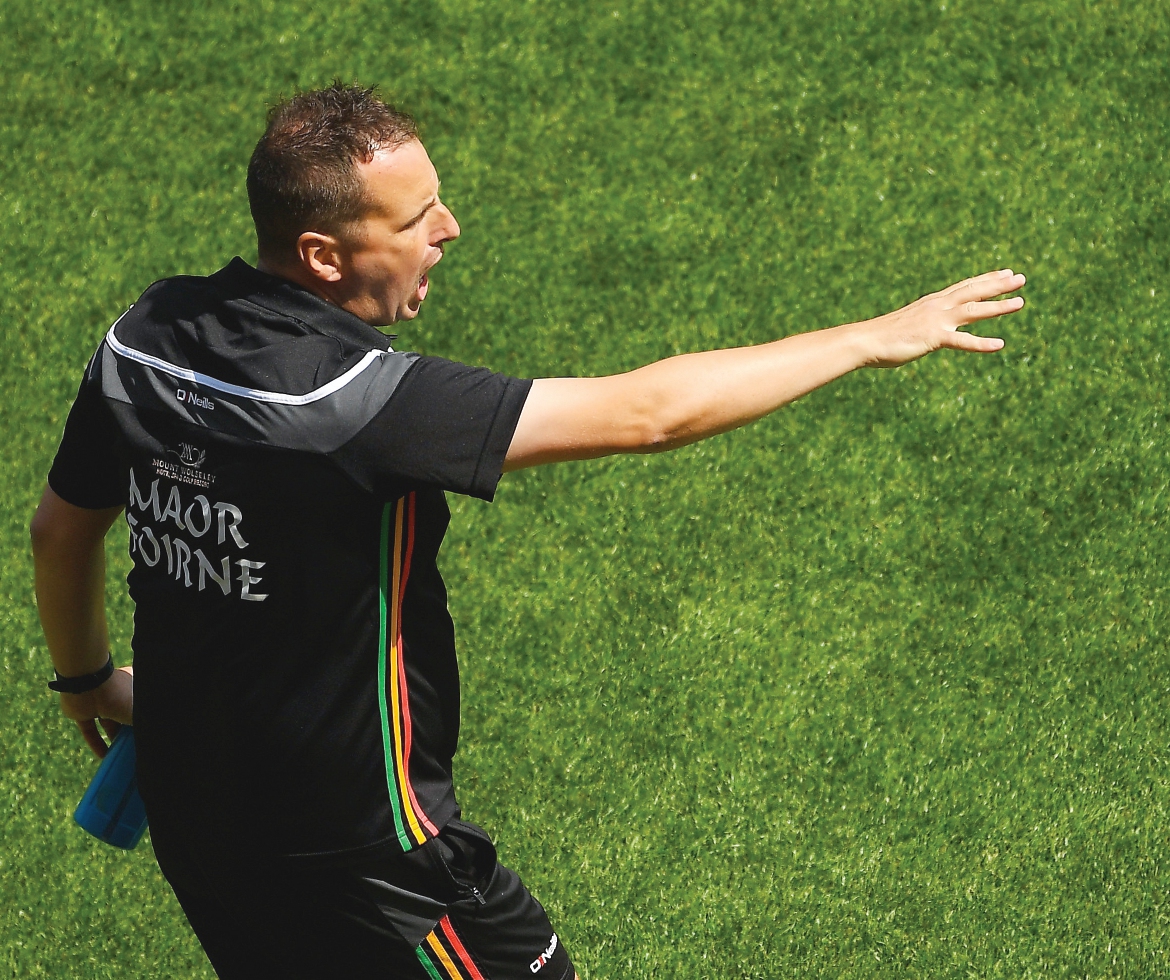Steven Poacher is planning for his first season as a county senior manager with Leitrim. He spoke with Michael McMullan to chart his coaching origins his learnings along the way
MANCHESTER is a long way from Carrick on Shannon but that’s where Steven Poacher slipped his foot on the first rung of the coaching ladder.
Not yet turned 20 and a trainee teacher at university, he looked around for a Gaelic football team. There was none.
What next? He dug the foundations for a new one. There were a few Ulster players, some from Cork and Galway. He mixed in a few Scots who were up for a crack at it.
He approached a bar in Manchester that wasn’t exactly booming. In exchange for a set of jerseys, he’d bring a bunch of thirsty student footballers in for a few Sunday scoops.
That was 1999. A defeat in the final of the British Championship saw them miss out on a spot in the Trench Cup but Poacher had been bitten by the coaching bug.
He kept a jotter of drills and his thoughts. They’d train twice a week and play a game at the weekend.
At the time, he played, coached, drove the mini bus. Everything, and it was enough to pick up a Colours award for services to Gaelic football.
It was one part of the learning. The other was observing what his father Anthony brought as the successful manager of their local Damolly Rovers soccer team in Newry that he alsostarted from scratch.
“Daddy would have managed the likes of Benny Coulter, Danny Hughes, Mickey Walsh and Ronan Sexton,” Poacher said.
“They would have a great respect for him still and you would always have taken life lessons from him from a management point of view.”
For Poacher, that is coaching. It’s about building relationships. Getting players on board.
He quotes the late John Morrison. A player won’t care what you know until they know that you care.
“There’s so much going on in a young person’s life,” added Poacher. “I think it’s crucially important that you’re there in a support network as much as a coaching and managing network.”
He thinks back to the connections at university in Manchester. A soccer player, of the protestant persuasion, on the GAA team he coached would still fire him a radiant social media message about those memories now 25 years old.
Poacher also remembers his father dropping him from the u-14 soccer team when he initially thought his birth certificate would help him nail down a spot.
But Anthony Poacher wasn’t wired that way. Places needed earned. Poacher Junior learned the first important lesson in sucking up disappointment.
“He was ahead of his time too,” he said. “You’re talking about the early nineties here. We had one touch football, playing 3v2 and 3v3s, stuff that is now all in vogue.
“We didn’t realise it then but we were creating angles and learning how to exploit space.”
There were no coaching manuals. Just life experience converted into laying a message to follow.
***
A BADLY torn hamstring and falling out of love with playing was replaced by the intrigue of coaching. At the age of 29, Down club An Riocht was his first management job.
The coaching bug had intensified two years earlier when he steered St Columban’s, Kilkeel to the All-Ireland A Vocational Schools title despite picking out of a small playing pool.
“That gave me a real bug and thirst and hunger for coaching,” he recalls.
He picked up nuggets when they shone in the wilderness. His father. Former club managers in Newry Mitchel’s – Ross Carr and Johnny McComiskey.
There was the experience of trialling for and being selected for the first Underdogs team and coming up against the Dubs.
“I was only 23 at the time but Mickey Ned O’Sullivan was a massive, massive influence,” Poacher said of another chapter.
“The pearls of wisdom that man gave and that was 22 years ago. Brian Mullins was involved in that setup as well, great men to learn from.”
Poacher was a sponge. As a teacher, he began to think deeper than playing.
Like the days of the jotter, he was picking through a coach’s output for what he felt would work. If something was a negative, it was locked away too.
The county calling came with a request to lend a hand with the Down development squads on the back of his involvement with Kilkeel’s school success.
Neil Collins then added Poacher to the Down u-21 management for three seasons in 2010.
During that tenure they took a fancied Tyrone side to a second replay before the Red Hands pulled away in the second half after again being deadlocked.
“That was my first proper stint into the county stuff and I thoroughly enjoyed it,” Poacher said.
“From that, I had the four years in Carlow from 2016 to 2019 and they were great years.
“It was a great education. You learned an awful lot very quickly because we didn’t have a big management team and Turlough (O’Brien, manager) would’ve gave you complete ownership of it.”
There was a stint working with Down minors before going into Roscommon under manager Anthony Cunningham.
“That experience was brilliant too,” Poacher added. “They had a really high-performance environment with brilliant players.”
With the outbreak of Covid-19, there wasn’t the same access to players and it was a skeleton competition with tough assignments against Dublin, Galway and Kerry.
For Poacher, it was all learning. When in Carlow, they locked horns with Dublin in a Leinster quarter-final game screened live on Sky Sports.
“You’re facing probably the greatest coached team in the history of the game,” Poacher said of their challenge. A Division Four team against the best in the business. Physically. Technically. Every way. Yet humble.
“I’m sure people were thinking the worst, that it could’ve been lambs to the slaughter.”
The Carlow management team felt confident they could be competitive but they needed to prevent Dublin’s wave. Poacher worked with the Carlow goalkeeper to slow their own kick-outs down to the limit, calculating how they could eat up a minute each time.
At the other end, they’d always mark the Dublin right corner-back to make sure Stephen Cluxton wasn’t able to kick across his body.
Forcing him to change his body shape, opening out for the kick off his left foot dictated where Carlow could hunt down any player they felt would delay in possession.
“We felt if we delayed them a little bit on the ball, it gave us more time to get back into our defensive shape,” Poacher explained.
The small margins kept them in touch until midway through the second half. Having gone down to 14 men with the dismissal of Brendan Murphy, there is always a guess at how further they could’ve stayed in the game with a full complement.
“They are the greatest learning experiences,” Poacher adds. “You want to be pitting your wits against the best.
“When I went to Carlow, the mentality was that you play the challenges games against club teams or against Kildare juniors.”
All of a sudden, they were making journeys to play the Monaghans, the Tyrones and the Armaghs.
It was about selling a different set of standards to players and level of belief.
***
NOW Poacher is paddling his own canoe as manager of Leitrim after Mickey Graham’s change of heart since being appointed as their boss left the vacancy.
After 15 years of club management and being in the cocoon of inter-county football, Poacher has stepped out of his comfort zone. It’s a massive challenge but you can hear the excitement in his voice.
Now he has to deal with club managers, county boards, the media, both his squad and management teams. Administration brings a more sizeable chunk. His phone will buzz and ring more often.
He is thankful the men he contacted about coming into his management all said yes. Three phone calls and three answers he wanted.
“Anthony McGrath is a fantastic guy,” Poacher said. “He’s coming in from a coaching perspective but also in sports performance. He won an Ulster title with Donegal under Declan Bonner.”
Daniel St Ledger is someone he knows well having coached him in Carlow. He comes in with experience of coaching St Sylvester’s in Dublin and with over 120 games as a player.
“He brings a wealth of experience particularly in in the lower divisions and understands the dynamics of the lower divisions,” Poacher adds.
“Then you have Ryan (Jones) who was captain of Fermanagh and who coached Leitrim u-20s last year,” he said of Jones, who regularly contributes with St Ledger and Poacher on The Locker Room podcast.
Barry McGuire was there last season and will again take charge of analysis. Patrick Sharkey remains as goalkeeper coach. Barry McWeeney, who was also in under Andy Moran, will be looking after the u-20s.
“Leitrim have a lot of good pieces of jigsaw in place,” added Poacher, explaining the excellent facilities he’ll have at his disposal.
“They were putting a savage amount of work behind the scenes. Their u-20s beat Galway and Mayo for the first time in over 30 years and that’s massive for the county.”
Looking at what is coming down the tracks in Division Three, Poacher rattles off Kildare and Fermanagh with Clare having many of their players returning under new manager Peter Keane.
“It’s going to be competitive and it’s going to be tough,” Poacher said. “You just want to try and install a level of belief for this group of players that they’re good enough to compete with these teams.”
There is also the factor of their late appointment after Graham stepped away.
“Mickey had his own reasons for stepping away and everybody is entitled to do what they like,” Poacher said of the U-turn before his own appointment.
“There is no gun to anybody’s head and whatever has happened has happened. For me, it’s a fresh start.
“I think that’s one of the beauties. At our first meeting a few weeks ago, we had 47 players in the room and the county champions were excused because they were still playing in Connacht.
“We had four or five genuine excuses, so that’s well over 50 players that are willing to commit and play and that’s what you want.”
With Graham not involved after being there last season, Poacher terms it a “blank canvas”. It’s a new chapter in Leitrim’s history with no baggage.
Aidan Flynn has retired. Pierce Dolan and Mark Plunkett are heading to Australia.
Poacher made phone calls to everyone from last year’s panel. With the help of the members of the management retained from last year, a delve into the club championship flashed up “10 or 11 names for a close look. There are a handful of young players coming up from the u-20 grade.
“If you can get a group of players who are willing to commit for four or five years to a process, to a structure, to an S&C program, then the world’s your oyster,” Poacher said.
He understands some will have the itch to travel and that’s okay. Everyone is their own man.
“One thing is for sure, when they’re in the environment that we are going to create, they will really enjoy it and they’ll thrive,” Poacher said of his initial vision for the camp. Spirit. Togetherness. Culture. Standards.
“They’ll really enjoy their football because that’s what we ultimately want them to do.
“Football should be enjoyed, not endured. I think that’s the big thing, maybe lads haven’t enjoyed their football. They’ll enjoy it because we will create a nice harmony and a nice environment where players can flourish.
“Hopefully, these younger players that are coming through, we can give them opportunities and we can give them the set-up that allows them to really reach their potential.”
In terms of targets, Poacher looks at the basics first. Getting the best players in the jersey is first and foremost.
When Saturday, December 7 comes and the green light flashes for collective training, Leitrim must be ready to hit the ground running.
Then they can tune into a pattern of play and work in conjunction with any new rules that may be rolled out by Jim Gavin’s FRC.
It’s not in Poacher’s remit but he doesn’t want wholesale changes. Just the subtle ones that will add value.
He reiterates a conversation he had with new Roscommon coach Mark Doran recently on The Locker Room podcast.
The game is in a better state than the negativity surrounding Magherafelt’s televised game with Newbridge flagged up.
“I thought the game was coming round again,” he said of the bigger picture. “I thought that the club game in particular had some brilliant games and that’s because teams are playing at a very similar level.”
He hints at a three-tier league format the GAA should explore. And the same for the championship, with all 32 counties still in the hat for the Sam Maguire.
Just like it was when he was player-manager of his first team in Manchester in 1999 and watching his father shape Damolly Rovers and working out Cluxton’s preferred corner back for a kick-out, Steven Poacher is always thinking. Leitrim fans will be interested to see what’s in his latest jotter.
Receive quality journalism wherever you are, on any device. Keep up to date from the comfort of your own home with a digital subscription.
Any time | Any place | Anywhere















